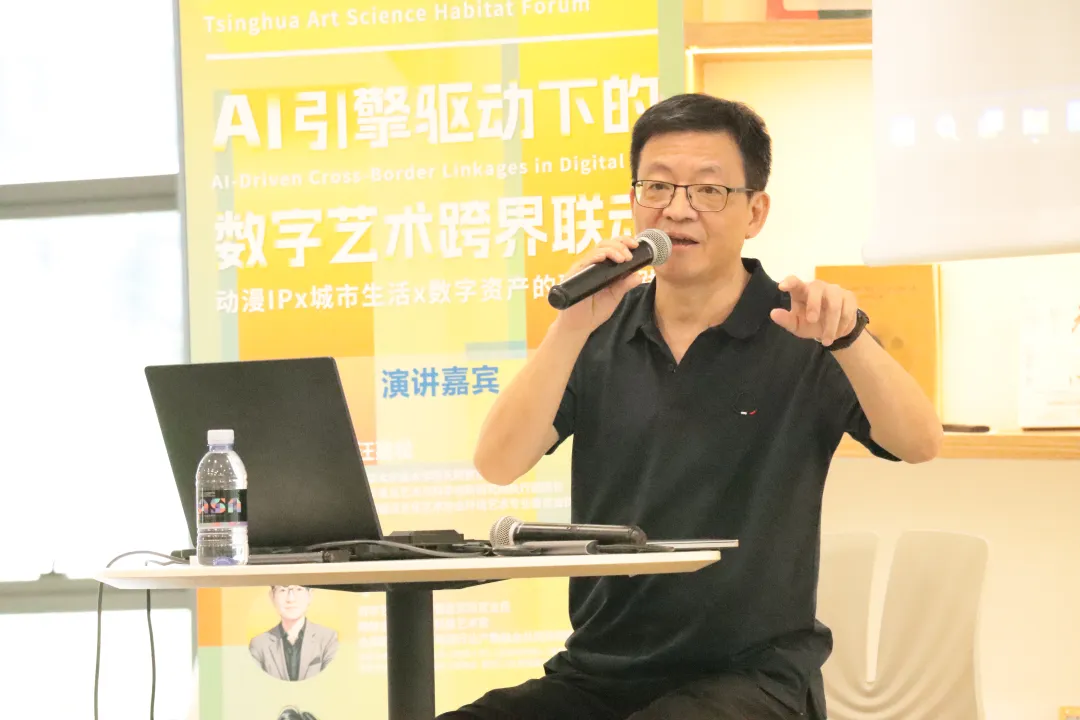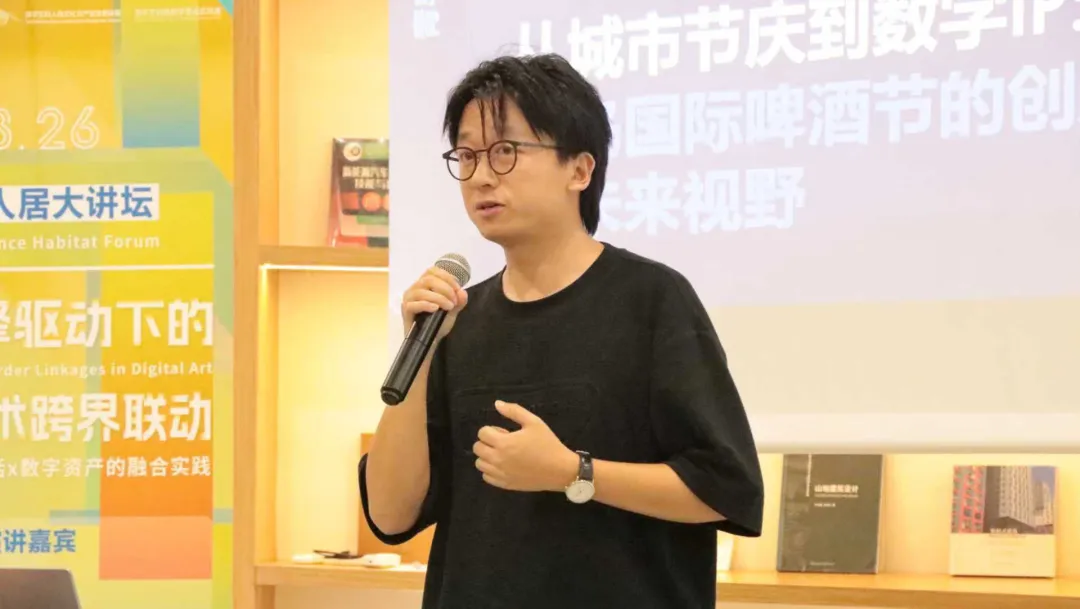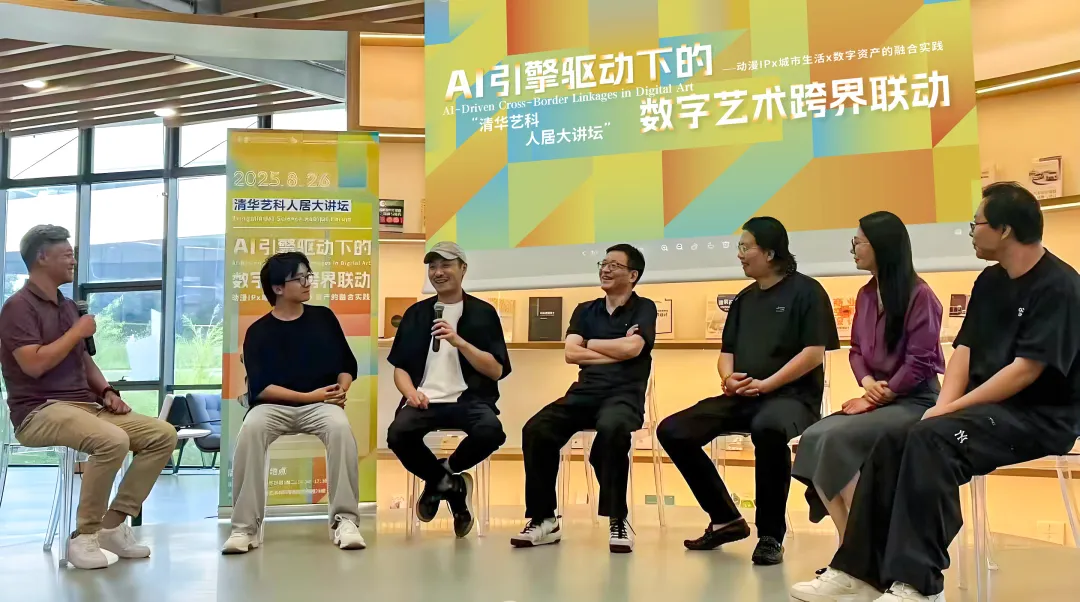TASA Habitat Forum | "AI-Driven Cross-Border Linkages in Digital Art" Themed Salon Successfully Held

On August 26, 2025, the Tsinghua (Qingdao) Academy of Arts and Science Innovation Research (TASA) successfully hosted a salon with the theme of "AI-Driven Cross-Border Linkages in Digital Art." With a focus on the innovative practice of "anime IPs + urban life + digital assets," this event aims to explore the deep integration and development paths of culture, art, and technology in the AI era.
The salon was divided into two main sessions: thematic sharing and roundtable dialogue. During the thematic sharing, WANG Jiansong, Executive Vice President of TASA, LI Lei, Director of the Digital Creation Laboratory, and WANG Kang, Deputy General Manager of Qingdao West Coast Beer Culture Group Co., Ltd., served as keynote speakers. They provided in-depth elaborations on multiple perspectives, including digital art education, technological practice and implementation, and digital asset and cultural IP development. The roundtable dialogue brought together numerous cross-disciplinary entrepreneurs and experts, including DIAO Lei, Deputy General Manager of the Market Development and External Cooperation Center at Wemake (Qingdao) Digital Creative Technology Co., Ltd.; ZHANG Lihua, Producer of Zhonghe Film (Qingdao) Co., Ltd.; GAO Hetong, Lubao Culture Media (Shenzhen) Co., Ltd.; GAO Shizheng, Chairman of Beijing Xianxian Artificial Intelligence Technology Co., Ltd.; and GE Haiyou, General Manager of Yuanfei (Qingdao) Cultural Tourism Industry Co., Ltd. They engaged in profound discussions on the cross-border integration of digital art. This salon was one of the significant events in the "TASA Habitat Forum" series and was hosted by CHEN Xin, Senior Director of the Future Habitat Culture and Industry Research Center, TASA.

01
Anime ips and urban life
动漫IP与城市生活

WANG Jiansong, a professor and Ph.D. supervisor of the Academy of Arts & Design, Tsinghua University (AADTHU) and Executive Vice President of TASA, systematically reviewed the excellent contributions of senior artists from AADTHU in the fields of Chinese anime and public art by tracing the historical context of Chinese anime. He also elaborated on the core value of traditional Chinese culture and visual narrative in contemporary design education and practice. Mr. WANG Jiansong pointed out that AI engines should be deemed as the core driver for systematically exploring and modernizing traditional Chinese IP symbols, thereby building a cultural expression system and design standards with an international level. By transforming classic cultural resources such as Journey to the West and The Literary Mind and the Carving of Dragons into digital assets that combine contemporary aesthetics and interactivity, digital art can be deeply integrated with urban spaces, cultural tourism formats, and museum exhibitions, creating a new paradigm of immersive storytelling. He emphasized the necessity of leveraging cross-disciplinary and cross-industry ecological collaboration to integrate resources from universities, enterprises, and governments, and establishing a full-chain innovation ecosystem from cultural excavation to industrial application. Ultimately, this approach will achieve the international dissemination of Chinese digital art and anime IPs, showcasing Chinese stories with spiritual depth to the world.
02
Collaboration in digital art driven by AI engines
AI引擎驱动下的数字艺术跨界联动

LI Lei, Director of the Digital Creation Laboratory of TASA, drew on his nearly two decades of industry experience to review the three key developmental stages of Chinese anime: introduction and reference, commercialization development, and digital rise. AI engines are becoming the core force to drive industrial upgrade and cross-border collaboration, according to LI. Faced with challenges in the digital asset field, such as a lack of standards, weak platforms, and insufficient copyright protection, it's necessary to accelerate the building of a digital asset library of traditional Chinese culture characterized by high value and connectivity, thus promoting the digital protection and commercial innovation of cultural heritage like ancient architecture and traditional crafts. Additionally, he highlighted the need to adopt an international perspective, integrate global resources, and actively engage in international collaborative networks, while enhancing the quality of local content and commercial viability. These efforts will drive the deep dissemination and industrial impact of Chinese digital art on the global stage, developing a digitally cultural ecosystem with global competitiveness.
03
From urban festivals to digital ips
从城市节庆到数字IP

WANG Kang, Deputy General Manager of Qingdao West Coast Beer Culture Group Co., Ltd., shared thoughts themed on "From Urban Festivals to Digital IPs: Innovative Practices and Future Visions of the Qingdao International Beer Festival." He stated how the Qingdao International Beer Festival, an iconic urban festival in Asia, is undergoing a strategic transformation from a traditional festival to a digital IP ecosystem driven by AI engines. Through the generation of digital artworks, interactive stories, and short video content by the artificial intelligence generated content (AIGC) technology, the group has built a digital IP matrix centered around "HaJiu," which deeply integrates local cultural elements with international aesthetic expressions. In the future, attention will be paid to promoting innovative applications such as digital identity tags and digital memory storage, enabling cross-border collaboration between digital art and physical festivals, and creating a new cultural tourism experience featuring virtual-real symbiosis. This practice provides an innovative paradigm for the digital upgrading of traditional festivals, continuously unleashing the industrial value and international dissemination power of urban IPs through the dual drive of technological empowerment and cultural innovation.
04
Roundtable Dialogue
圆桌对话
During the roundtable dialogue, participating experts and entrepreneurs engaged in in-depth discussions on the core topic of how AI and digital technologies empower the fusion of culture and art and industrial transformation. There was a consensus that cutting-edge technologies such as virtual production, real-time engines, and VR/AR are continuously boosting the structural upgrades of the digital art and cultural tourism industry. However, the shortage of interdisciplinary talent remains a prominent challenge, necessitating strengthened university-enterprise collaboration to enhance talent cultivation. Meanwhile, tools like AI design, blockchain, and digital marketing can effectively support the transformation of regional cultural IPs into sustainably operational digital assets. The film and television industry also needs to positively explore new formats such as short videos and digital collections, in an effort to extend the value chain and lifecycle of content. According to the dialogue, digital art should be rooted in tradition while embracing the international stage, accelerating the establishment of mechanisms for the confirmation of rights, trading, and cross-border circulation of digital assets to promote the sustainable transformation of cultural resources through institutional innovation. True integration and innovation must rely on the cross-border collaboration of technical experts, artistic creators, industry operators, and cultural scholars, to jointly build a new digital ecosystem characterized by human-machine coexistence, virtual-real symbiosis, and cultural prosperity. This will lead the cultural industry toward a high-quality, sustainable, and new development stage amid technological waves.

Since its inception, the "TASA Habitat Forum" has consistently focused on establishing a new paradigm for human habitat development that integrates "theoretical breakthroughs, technological innovation, industrial development, and civilizational symbiosis." As its founding institution, the TASA Habitat Culture and Industry Development Alliance will keep using the Habitat Forum as a key strategic platform to host themed salons and integrate cutting-edge theories, innovative technologies, policies, and financial resources, thereby effectively contributing to the advancement of future human habitat culture and industry development.
